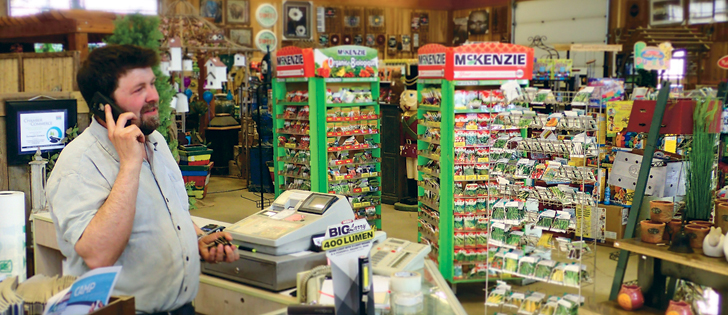FORT MCMURRAY, Alta. — The Clearwater River flows gently beside Dunvegan Gardens but the hills surrounding the garden centre, greenhouse and market garden show how close the fire of 2016 came to shattering the calm.
Like much of the area around this northern Alberta city, blackened tree trunks stand as stark reminders of a disaster that destroyed parts of a city and caused billions of dollars in damage.
Brad Friesen owns Dunvegan Gardens along with his father, Ron. Last May, he and his family were among about 80,000 people forced to flee the area.
Read Also

Using artificial intelligence in agriculture starts with the right data
Good data is critical as the agriculture sector increasingly adopts new AI technology to drive efficiency, sustainability and trust across all levels of the value chain.
The wildfire burned the shop behind his house and part of the backyard fence. It burned old pallets stacked behind the greenhouse and came within about three metres of the chicken coop where about 100 birds were housed.
“I guess God spared us,” Friesen said.
He believes the open fields that make up the 75-acre operation, plus the gravel parking lot around the greenhouse and garden centre, served as a firebreak.
In the gardens, the fire delayed planting for about a month, into early June, but that turned out surprisingly well.
“We probably had our best crop and yet it was the latest we have ever planted,” he said.
Even the sweet corn, planted June 9, was ready for harvest by Aug. 15, only a few weeks later than usual. The warm soil, fertilizer supplied by ash and good moisture allowed the crop to catch up over the summer.
Friesen started the operation here in 2005, on the site of the former Grey Gardens operation.
Since then, he has seen occasional floods of his low-lying land, a 2007 plow wind that destroyed a 15,000 sq. foot greenhouse and then had the narrow escape from last year’s fire.
After surviving all that, Friesen said the biggest threat to the operation is red tape.
The city is asking for various licences and issued a stop-work order regarding his livestock, which he has successfully challenged.
As well, a neighbour has filed a lawsuit because of objections to land use.
Friesen said farming in the region is challenging for many reasons, among them Fort McMurray’s distance from major suppliers.
“But that’s not as much a problem as the actual permits with the city. They currently want me to get rid of all my animals. They say that I need a licence,” he said.
“They’re definitely anti-agriculture. That’s what I like to say, anyway. The city is the worst obstacle that there could be for farming.”
Dunvegan Gardens has about 100 chickens, 10 sheep and 15 pigs. Friesen has a premises identification number from the province and is working to get intensive agriculture licensing from the city. He has permits for a tree nursery and sod farm, but has been told others are required.
“Right now, if I can’t keep my animals, eventually then we’re just going to leave, because to me it’s not a place I want to be,” said Friesen.
Whether that is a serious option or spoken out of frustration, Friesen is unimpressed with the city’s stated requirements and with related legal fees. He said a petition circulated after the stop-work order generated 15,000 signatures, which he took as a strong show of community support for the operation.
Dunvegan Gardens, which employs about 70 people, is named for the historic Dunvegan region in the province’s northwest, where the family has its roots. It includes a landscaping service, garden plots rental and an annual corn maze.
Last year’s maze featured outlines of people and the words “Fort Mac Strong” and “Everyday Heroes” in a salute to the region’s struggle and resilience.
















